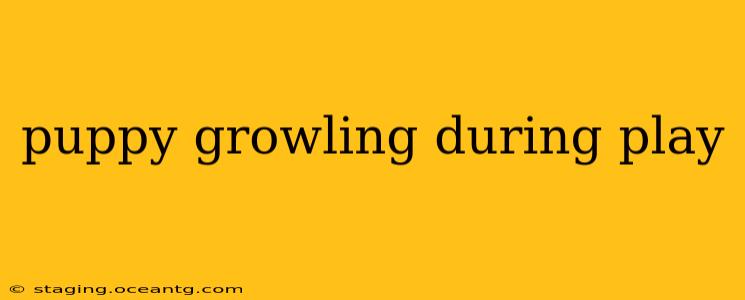Puppyhood is a time of immense growth and development, both physically and behaviorally. While playful nips and bumps are common, understanding why your puppy growls during playtime is crucial for raising a well-adjusted and happy canine companion. Growling isn't always a sign of aggression; it can be a form of communication, often misinterpreted by inexperienced owners. This comprehensive guide will help you decipher your puppy's growls and take appropriate action.
Why Does My Puppy Growl During Play?
Puppy growls during play stem from a variety of reasons, not all of them negative. It's essential to understand the context of the growl to determine its meaning. Some common causes include:
-
Overexcitement: Puppies, especially high-energy breeds, can get so caught up in play that they unintentionally growl due to sheer excitement. This is often accompanied by other playful behaviors like jumping, tail wags, and loose body posture.
-
Self-Protection: Even in playful interactions, a puppy might growl if they feel overwhelmed, overstimulated, or uncomfortable. This is a protective mechanism, a way of saying, "Whoa, back off a bit!"
-
Resource Guarding: While less common during play, a puppy might growl if they perceive a toy or even your hand as a valuable resource they need to protect. This is a more serious concern that requires careful management.
-
Fear or Anxiety: A puppy who is fearful or anxious might growl defensively as a warning signal. This is usually accompanied by other signs of anxiety, such as tucked tail, flattened ears, and avoidance behavior.
-
Learning to Play: Puppies are still learning the nuances of canine communication and social play. They might growl out of misunderstanding or clumsiness, not necessarily malicious intent.
Is My Puppy's Growl Aggressive?
Distinguishing between playful and aggressive growls is paramount. Play growls are usually low-pitched, short, and accompanied by other playful signals. Aggressive growls, on the other hand, are typically high-pitched, sustained, and accompanied by stiff body posture, bared teeth, and piloerection (hair standing on end). If you're unsure, it's always best to err on the side of caution and seek professional guidance from a veterinarian or certified dog trainer.
How Can I Stop My Puppy From Growling During Play?
The approach to addressing your puppy's growling depends entirely on the underlying cause. Here's a breakdown of effective strategies:
-
Manage Excitement: Ensure playtime is structured and controlled. Use short, frequent play sessions to prevent overstimulation. Introduce quiet breaks to allow your puppy to calm down.
-
Teach Bite Inhibition: Gentle handling and teaching bite inhibition are vital from a young age. If your puppy nips too hard, immediately stop playing and briefly remove yourself from the interaction. This teaches them that excessive biting results in the loss of play.
-
Respect Boundaries: Pay close attention to your puppy's body language. If they show signs of discomfort or stress, stop playing and give them space. This respects their boundaries and helps prevent escalation.
-
Address Fear or Anxiety: If fear or anxiety are contributing factors, consider working with a certified professional dog trainer or veterinary behaviorist to develop a desensitization and counter-conditioning plan.
-
Consult a Professional: If you're unsure about the cause of your puppy's growling or if the growling seems aggressive, consulting a veterinarian or a certified professional dog trainer is crucial. They can provide personalized guidance and help develop a tailored training plan.
What Are Some Common Mistakes to Avoid?
Punishing a puppy for growling can worsen the problem. Growling is a form of communication, and punishing it can suppress the warning signal, potentially leading to a sudden bite with no prior warning. Instead, focus on proactive strategies to prevent the growling from happening in the first place.
When Should I Seek Professional Help?
Seek professional help from a veterinarian or certified dog trainer if:
- The growling is frequent and intense.
- The growling is accompanied by other signs of aggression, such as snapping or biting.
- You're unsure about the cause of the growling.
- Your attempts to address the behavior haven't been successful.
By understanding the nuances of canine communication and implementing appropriate training techniques, you can help your puppy develop into a well-adjusted and happy companion. Remember, patience and consistency are key to successful puppy training.
